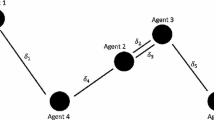Abstract
Flocking is a very challenging problem in a multi-agent system; traditional flocking methods also require complete knowledge of the environment and a precise model for control. In this paper, we propose Evolutionary Multi-Agent Reinforcement Learning (EMARL) in flocking tasks, a hybrid algorithm that combines cooperation and competition with little prior knowledge. As for cooperation, we design the agents’ reward for flocking tasks according to the boids model. While for competition, agents with high fitness are designed as senior agents, and those with low fitness are designed as junior, letting junior agents inherit the parameters of senior agents stochastically. To intensify competition, we also design an evolutionary selection mechanism that shows effectiveness on credit assignment in flocking tasks. Experimental results in a range of challenging and self-contrast benchmarks demonstrate that EMARL significantly outperforms the full competition or cooperation methods.
Y. Guo, X. Xie and R. Zhao—Equal Contribution.
Access this chapter
Tax calculation will be finalised at checkout
Purchases are for personal use only
Similar content being viewed by others
References
“boid multi-agent rl environment & multi-agent rl agent” (2020). https://github.com/zombie-einstein/flock_env
Bansal, T., Pachocki, J., Sidor, S., Sutskever, I., Mordatch, I.: Emergent complexity via multi-agent competition. arXiv preprint arXiv:1710.03748 (2017)
Bardi, M., Cardaliaguet, P.: Convergence of some mean field games systems to aggregation and flocking models. Nonlinear Anal. 204, 112199 (2021)
Bonabeau, E.: Agent-based modeling: methods and techniques for simulating human systems. Proc. Natl. Acad. Sci. 99(suppl_3), 7280–7287 (2002)
Chang, W., Lizhen, W., Chao, Y., Zhichao, W., Han, L., Chao, Y.: Coactive design of explainable agent-based task planning and deep reinforcement learning for human-UAVs teamwork. Chin. J. Aeronaut. 33(11), 2930–2945 (2020)
Chen, C., Hou, Y., Ong, Y.S.: A conceptual modeling of flocking-regulated multi-agent reinforcement learning. In: 2016 International Joint Conference on Neural Networks (IJCNN), pp. 5256–5262. IEEE (2016)
Drugan, M.M.: Reinforcement learning versus evolutionary computation: a survey on hybrid algorithms. Swarm Evol. Comput. 44, 228–246 (2019)
Foerster, J., Farquhar, G., Afouras, T., Nardelli, N., Whiteson, S.: Counterfactual multi-agent policy gradients. In: Proceedings of the AAAI Conference on Artificial Intelligence, vol. 32 (2018)
Grover, P., Bakshi, K., Theodorou, E.A.: A mean-field game model for homogeneous flocking. Chaos Interdiscip. J. Nonlinear Sci. 28(6), 061103 (2018)
Hu, Y., Gao, Y., An, B.: Multiagent reinforcement learning with unshared value functions. IEEE Trans. Cybern. 45(4), 647–662 (2014)
Hung, S.M., Givigi, S.N.: A q-learning approach to flocking with UAVs in a stochastic environment. IEEE Trans. Cybern. 47(1), 186–197 (2016)
Hung, S.M., Givigi, S.N., Noureldin, A.: A dyna-q (lambda) approach to flocking with fixed-wing UAVs in a stochastic environment. In: 2015 IEEE International Conference on Systems, Man, and Cybernetics, pp. 1918–1923. IEEE (2015)
Khadka, S., et al.: Collaborative evolutionary reinforcement learning. In: International Conference on Machine Learning, pp. 3341–3350. PMLR (2019)
Khadka, S., Tumer, K.: Evolution-guided policy gradient in reinforcement learning. In: Advances in Neural Information Processing Systems, vol. 31 (2018)
Konda, V., Tsitsiklis, J.: Actor-critic algorithms. In: Advances in Neural Information Processing Systems, vol. 12 (1999)
Lighthill, M.J., Whitham, G.B.: On kinematic waves ii. a theory of traffic flow on long crowded roads. Proc. Roy. Soc. Lond. Ser. A. Math. Phys. Sci. 229(1178), 317–345 (1955)
Lowe, R., Wu, Y.I., Tamar, A., Harb, J., Pieter Abbeel, O., Mordatch, I.: Multi-agent actor-critic for mixed cooperative-competitive environments. In: Advances in Neural Information Processing Systems, vol. 30 (2017)
Majumdar, S., Khadka, S., Miret, S., McAleer, S., Tumer, K.: Evolutionary reinforcement learning for sample-efficient multiagent coordination. In: International Conference on Machine Learning, pp. 6651–6660. PMLR (2020)
Mavridis, C.N., Tirumalai, A., Baras, J.S., Matei, I.: Semi-linear Poisson-mediated flocking in a Cucker-Smale model. IFAC-PapersOnLine 54(9), 404–409 (2021)
Perrin, S., Laurière, M., Pérolat, J., Geist, M., Élie, R., Pietquin, O.: Mean field games flock! the reinforcement learning way. arXiv preprint arXiv:2105.07933 (2021)
Quera, V.Q.J., Salvador Beltrán, F., Dolado i Guivernau, R.: Flocking behaviour: agent-based simulation and hierarchical leadership. Jasss-J. Artif. Soc. Soc. Simul. 13(2), 8 (2010)
Reynolds, C.: Boids background and update (2001). http://www.red3d.com/cwr/boids/
Tan, M.: Multi-agent reinforcement learning: independent vs. cooperative agents. In: Proceedings of the Tenth International Conference on Machine Learning, pp. 330–337 (1993)
Toner, J., Tu, Y.: Flocks, herds, and schools: a quantitative theory of flocking. Phys. Rev. E 58(4), 4828 (1998)
Weaver, L., Tao, N.: The optimal reward baseline for gradient-based reinforcement learning. arXiv preprint arXiv:1301.2315 (2013)
Wu, J., Liu, Y.: Flocking behaviours of a delayed collective model with local rule and critical neighbourhood situation. Math. Comput. Simul. 179, 238–252 (2021)
Yan, C., Xiang, X., Wang, C.: Fixed-wing UAVs flocking in continuous spaces: a deep reinforcement learning approach. Robot. Auton. Syst. 131, 103594 (2020)
Yan, C., Xiang, X., Wang, C., Lan, Z.: Flocking and collision avoidance for a dynamic squad of fixed-wing UAVs using deep reinforcement learning. In: 2021 IEEE/RSJ International Conference on Intelligent Robots and Systems (IROS), pp. 4738–4744. IEEE (2021)
Zhu, S., Belardinelli, F., León, B.G.: Evolutionary reinforcement learning for sparse rewards. In: Proceedings of the Genetic and Evolutionary Computation Conference Companion, pp. 1508–1512 (2021)
Author information
Authors and Affiliations
Corresponding author
Editor information
Editors and Affiliations
Rights and permissions
Copyright information
© 2023 The Author(s), under exclusive license to Springer Nature Switzerland AG
About this paper
Cite this paper
Guo, Y., Xie, X., Zhao, R., Zhu, C., Yin, J., Long, H. (2023). Cooperation and Competition: Flocking with Evolutionary Multi-Agent Reinforcement Learning. In: Tanveer, M., Agarwal, S., Ozawa, S., Ekbal, A., Jatowt, A. (eds) Neural Information Processing. ICONIP 2022. Lecture Notes in Computer Science, vol 13623. Springer, Cham. https://doi.org/10.1007/978-3-031-30105-6_23
Download citation
DOI: https://doi.org/10.1007/978-3-031-30105-6_23
Published:
Publisher Name: Springer, Cham
Print ISBN: 978-3-031-30104-9
Online ISBN: 978-3-031-30105-6
eBook Packages: Computer ScienceComputer Science (R0)




